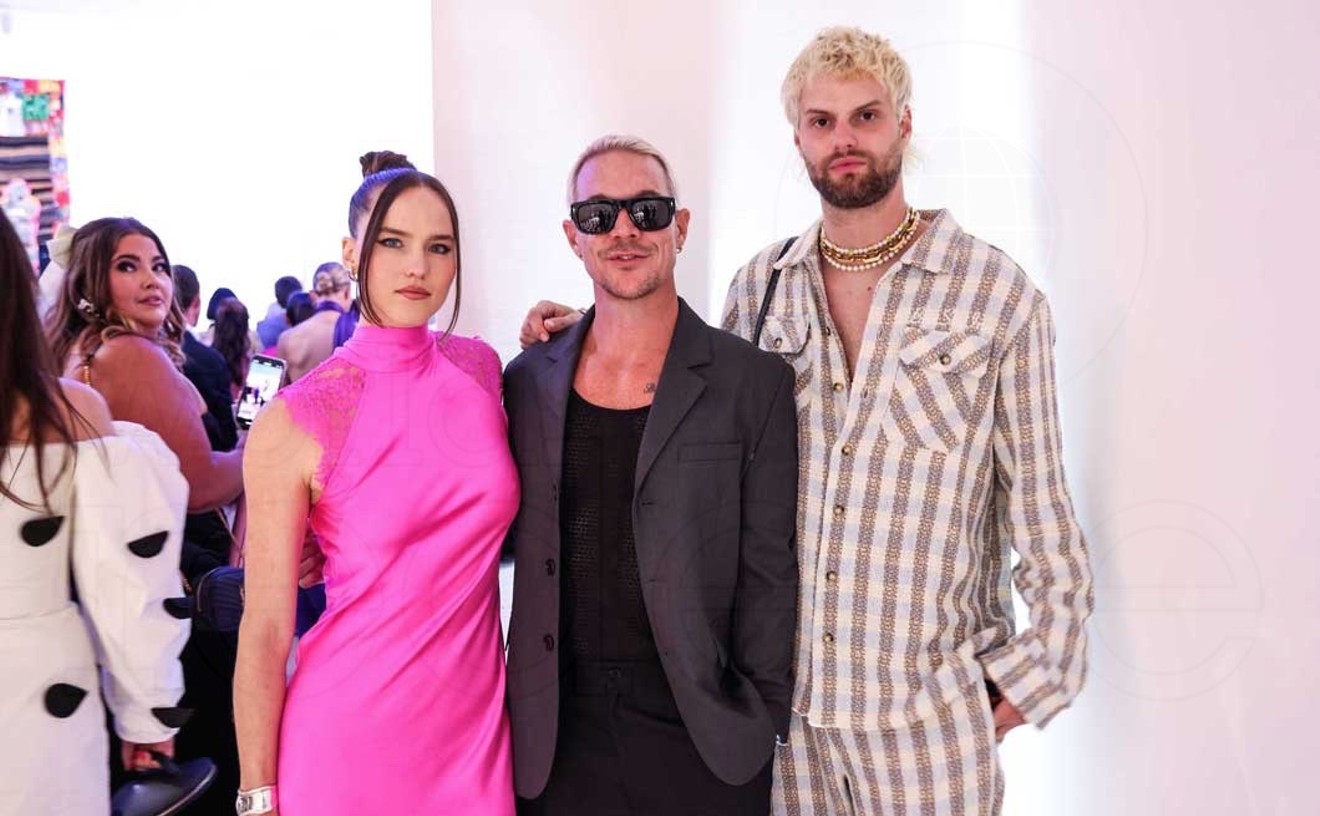Robert Caisley's new play, Happy, is set in one of storytelling's most durable venues for emotional exorcism: the dinner party. Has there ever been one of these gatherings in a theater that didn't climax in disaster? Petty arguments blossom into volcanic tirades, pregnant pauses omit unspoken truths, and friends leave as enemies. Happy, which is enjoying a "rolling world premiere" at New Theatre, among other regional playhouses across the country, is dinner-disaster dramedy on a grand scale — mean, moving, unpredictable, and open to interpretation.
In this instance, the warning signs begin long before appetizers are served. Alfred (Scott Douglas Wilson), a professor of French literature who was once a prominent writer, opens the play by arriving at his longtime bestie Eduardo's (Ernesto Miyares) artist's loft for a rare get-together.
He is immediately confronted by Eva (Maria Corina Ramirez), a sexy bit of sociopathic trouble in an orange bath towel. Eva is the middle-aged Eduardo's latest Lolita — a 22-year-old modern artist he picked up at a club — and her introductory chitchat with Alfred is alarming. She shares information about her brother's suicide, her revenge tactics against an abusive ex-boyfriend, and the vintage wine she steals from Eduardo's rainy-day collection.
All the while she's invading Alfred's personal space, teasing and emasculating him like a slacker succubus while polishing off almost everything in Eduardo's bar. She deliberately confuses the conversation, purposely mistaking facts and feigning ignorance about the basic details of Alfred's life. She does all of this to undercut Alfred's veneer of complacency and break him down psychically and emotionally.
This is how it goes for most of the first, and best, act of Caisley's 90-minute, three-act play. Director Ricky J. Martinez stages Alfred and Eva's interactions so they appear like two animals sizing each other up for the first time, with Eva the predatory aggressor and Alfred the curious but cowering submissive. Ramirez is very good in these scenes, but Wilson is better, especially when he's given nothing to do. Making the most of the play's embedded beats — lengthy, awkward moments of stupefying disconnection — Wilson punctuates them with seemingly endless reserves of nervous laughter and subtle flinches. And he moves with robotic stiffness whenever decorum suggests that he vacate his comfort position near the door (better to flee if the opportunity arises).
Eventually Eduardo shows up, all back-slappy toward Alfred and lascivious toward Eva, and for a while the unbearable tension eases. Then Alfred's wife of 14 years, Melinda (Jessica Marion Welch), finally turns up — she had been showing a new babysitter how to handle their 15-year-old daughter, who has cerebral palsy. Melinda, too, quickly becomes bait for Eva's sadistic game: to prove that happy people are really just as miserable as the rest of us.
I won't spoil the rest, but it suffices to say that blood is shed, disturbing admissions are made, and a mannequin's head is whacked off in anger. Caisley intended his play to be "a comedy until it stopped being one," and he successfully engineers a transition from uncomfortable comedy of un-manners to full-blown psychodrama — doing so in a much more elegant and complex way than Yasmina Reza's similar God of Carnage.
As Alfred goes from agitated to unhinged — aided by that timeless truth lubricant, alcohol — he becomes a more distressing and boorish figure, complementing the play's own drift into disturbia. Happy has a lot to say about the deleterious effects of repressing honesty behind a veil of contentment, and its revelations are so callous and bleak that the play becomes difficult to enjoy, which Caisley would probably take as a compliment. Cruel classics such as Who's Afraid of Virginia Woolf? and The Shape of Things look like signposts toward Caisley's vision.
There are imperfections in this piece, as is often the case with new works. Eduardo is a crucially underdeveloped character, given that he's the narrative glue connecting the play's polarizing leads. And, as Melinda, Welch expresses reactions that don't always jibe with the way her character should respond, particularly when it comes to her willful naiveté regarding the sexual tension between her agreeable husband and the leggy vixen seducing him.
But the result is certainly a triumph for the show's two leads. Ramirez is an inscrutable mask of certifiable vindictiveness and faux hurt whose monstrousness can yield sudden turns into riotous comedy, and Wilson is her tragic patsy who never looks like he's acting. Though it must be said: This is another flustered-nice-guy role for the increasingly typecast Wilson, who in recent years has contributed similar tones to The Pillowman, Winter, and The Drawer Boy. I would like to see him accept a part that is completely outside his wheelhouse.
Then there's the set, one of New Theatre's best scenic designs yet, courtesy of director Martinez. He has created a stylish, enviable live/work space with art deco furniture, a tasseled spiral staircase, a shelf of art books and esoteric trinkets, and, most prominent, framed torsos on the wall. The last are presented as sexy Eva's artwork, but it's really that of local artist Theresa Marie Callouri, who makes bold statements about gender, love, and relationships by festooning severed midsections with doorknobs, keyholes, flowers, traffic signs, fruit, and phalluses.
Like Happy, it's not for everyone, but good luck forgetting it.










